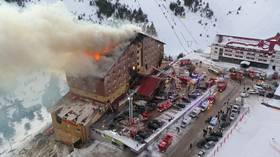Japanese researchers say air humidity a major risk factor for Covid-19, especially during winter months

Researchers wielding the processing power of a supercomputer have determined that air humidity plays a large role in the spread of the coronavirus through the air, with major implications for the winter months.
As the northern hemisphere braces for winter with the coronavirus, amid surging case numbers and the specter of more widespread lockdowns to come, researchers at the scientific research institute Riken and Kobe University in Japan have analyzed air quality and how it affects the spread of Covid-19.
Their computer models show that humidity impacts the dispersion of virus particles through the air. Dry indoor conditions, expected during the winter months, threaten to provide better conditions for the coronavirus to spread indoors, making each trip to the supermarket even more risky than before.
Also on rt.com ‘Current approach to Covid-19 is leading to pain, suffering & death’: Tory MP resigns from UK govt over coronavirus lockdownsThe researchers used the Fugaku supercomputer to create models of the emission and movement of aerosolized virus particles (such as those found when humans talk, cough, sneeze, or laugh) in indoor environments.
Air humidity below 30 percent was found to double the number of aerosolized particles in the air when compared with humidity levels of 60 percent or higher.
The team, led by Makoto Tsubokura, suggests humidifiers might limit the spread of infection during colder months when it’s not possible to have the windows open.
The study also determined that face shields are not as effective as face masks at stemming the tide of virus particles through the air. They also found that diners are more at risk of infection from those beside them, not across the table from them.
The Fugaku supercomputer previously modeled the spread of the virus in trains, offices, and classrooms, and has proven to be an important tool in informing public policy both in Japan and abroad.
Also on rt.com Dutch PM closes pubs, restaurants and cafes as coronavirus cases riseThink your friends would be interested? Share this story!














